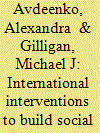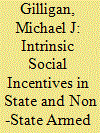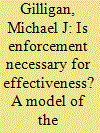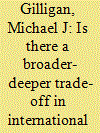| Srl | Item |
| 1 |
ID:
140804


|
|
|
|
|
| Summary/Abstract |
Increasingly the international community attempts to improve local public infrastructure in developing countries by creating more participatory local governance and social capital. We report on a randomized field experiment conducted in 24 communities (16 treated and 8 control) in rural Sudan. We offer a clearer theoretical statement of how these programs might alter the political landscape of the recipient villages. We measure norms using lab-in-the-field techniques and we measure network density with a survey of our 475 lab subjects. We appraise the participatory character of local governance and civic participation with a survey of 576 households. The program did not affect either networks or norms, but civic participation and the participatory nature of local governance increased. Thus we attribute the increase in citizen participation not to social capital growth but to more open local governing institutions.
|
|
|
|
|
|
|
|
|
|
|
|
|
|
|
|
| 2 |
ID:
189120


|
|
|
|
|
| Summary/Abstract |
How do non-state armed groups (NSAGs) survive and even thrive in situations where state armed groups (SAGs) collapse, despite the former’s often greater material adversity? We argue that, optimizing under their different constraints, SAGs invest more in technical military training and NSAGs invest more in enhancing soldiers’ intrinsic payoffs from serving their group. Therefore, willingness to contribute to the group should be more positively correlated with years of service in NSAGs than in SAGs. We confirm this hypothesis with lab-in-the-field and qualitative evidence from SAG and NSAG soldiers in Nepal, Ivory Coast, and Kurdistan. Each field study addresses specific inferential weaknesses in the others. Assembled together, these cases reduce concerns about external validity or replicability. Our findings reveal how the basis of NSAG cohesion differs from that of SAGs, with implications for strategies to counter NSAG mobilization.
|
|
|
|
|
|
|
|
|
|
|
|
|
|
|
|
| 3 |
ID:
075224


|
|
|
|
|
| Publication |
2006.
|
| Summary/Abstract |
Recently, scholars have questioned whether enforcement mechanisms are necessary to make regimes effective. This article provides a model of the international criminal regime in which the regime changes state behavior even though it possesses no enforcement mechanisms. The article also answers several prominent criticisms of the International Criminal Court (ICC). Critics claim that the ICC is at best futile because it lacks the power to apprehend the criminals it is meant to prosecute. Even worse, the ICC may be harmful because it will induce atrocious leaders to hold on to power longer than they would if they could step down with immunity for past crimes. The model in this article suggests those criticisms may be inaccurate. I model the interaction between a leader and a foreign state that has the option of offering that leader asylum. I examine the effect of the creation of an ICC-like institution on that interaction. The model produces three main findings. (1) Leaders' reigns will not be prolonged as a result of the regime. (2) Although the institution has no enforcement power, some leaders (those with such a high probability of being deposed that they would willingly surrender to the institution rather than try to stay in office) will be punished by it. In those circumstances, the foreign state has no incentive to offer the leader asylum. (3) The institution may deter some atrocities at the margin.
|
|
|
|
|
|
|
|
|
|
|
|
|
|
|
|
| 4 |
ID:
057730


|
|
|
| 5 |
ID:
152326


|
|
|
|
|
| Summary/Abstract |
United Nations policy forbids its peacekeepers and other personnel from engaging in transactional sex (the exchange of money, favors, or gifts for sex), but we find the behavior to be very common in our survey of Liberian women. Using satellite imagery and GPS locators, we randomly selected 1,381 households and randomly sampled 475 women between the ages of eighteen and thirty. Using an iPod in private to preserve the anonymity of their responses, these women answered sensitive questions about their sexual histories. More than half of them had engaged in transactional sex, a large majority of them (more than 75 percent) with UN personnel. We estimate that each additional battalion of UN peacekeepers caused a significant increase in a woman's probability of engaging in her first transactional sex. Our findings raise the concern that the private actions of UN personnel in the field may set back the UN's broader gender-equality and economic development goals, and raise broader questions about compliance with international norms.
|
|
|
|
|
|
|
|
|
|
|
|
|
|
|
|
| 6 |
ID:
121846


|
|
|
|
|
| Publication |
2013.
|
| Summary/Abstract |
Considerable resources are devoted to ex-combatant reintegration programs in current peace processes, but evidence on their effectiveness remains thin. We use original survey data to study an ex-combatant reintegration program implemented after Burundi's 1993-2004 civil war. Previous quantitative studies have found reintegration programs to be ineffective, but only ex-combatants who self-selected into programs were studied. We avoid such selection problems with a quasi-experimental design exploiting an exogenous bureaucratic failure. We find the program resulted in a 20 to 35 percentage point reduction in poverty incidence among ex-combatants and moderate improvement in livelihoods. But this economic boost does not seem to have caused political reintegration: while we find a modest increase in propensities to report civilian life as preferable to combatant life, we find no evidence that the program contributed to either more satisfaction with the peace process or a more positive disposition toward current government institutions.
|
|
|
|
|
|
|
|
|
|
|
|
|
|
|
|